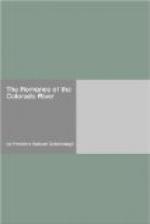* Hakluyt gives “25th,” but it is a misprint, as this Thursday in 1540 was the 26th.
Gradually, intercourse increased, and presents of trinkets seemed to incline all the natives in Alarcon’s favour. At length he discovered that they reverenced the sun, and without compunction he proclaimed that he came from that orb. This deception served him well. Henceforth no service was too great for the natives to perform for these sacred beings. Everything was placed at their disposal. Alarcon’s word was their law. They relieved the men entirely of the wearisome task of towing the boats, striving with each other for the privilege. Without this help it would have been impossible for Alarcon to have proceeded far up the river, and he fully appreciated this, though the chief reward bestowed on the helpers and all the natives was crosses made of sticks and of paper. These, he informed them by signs, were precious, and he distributed them in large numbers. The morning after he proclaimed himself as coming from the sun, many swam out to where the boat was anchored, contending for the privilege of securing the rope with which the boat was towed. “And we gave it to them,” says Alarcon, “with a good will, thanking God for the good provision which He gave us to go up the river.”
The interpreter frequently addressed the natives as he went forward, and at last, on Tuesday night, a man was discovered who understood him. This man was taken into the boat, and Alarcon, always true his trust, asked him whether he had seen or heard of any people in the country like himself, hoping to secure some clue to Coronado. “He answered me no, saying that he had some time heard of old men that very far from that country, there were other white men, and with beards like us, and that he knew nothing else. I asked him also whether he knew a place called Cibola and a river called Totonteac, and he answered me no.”




